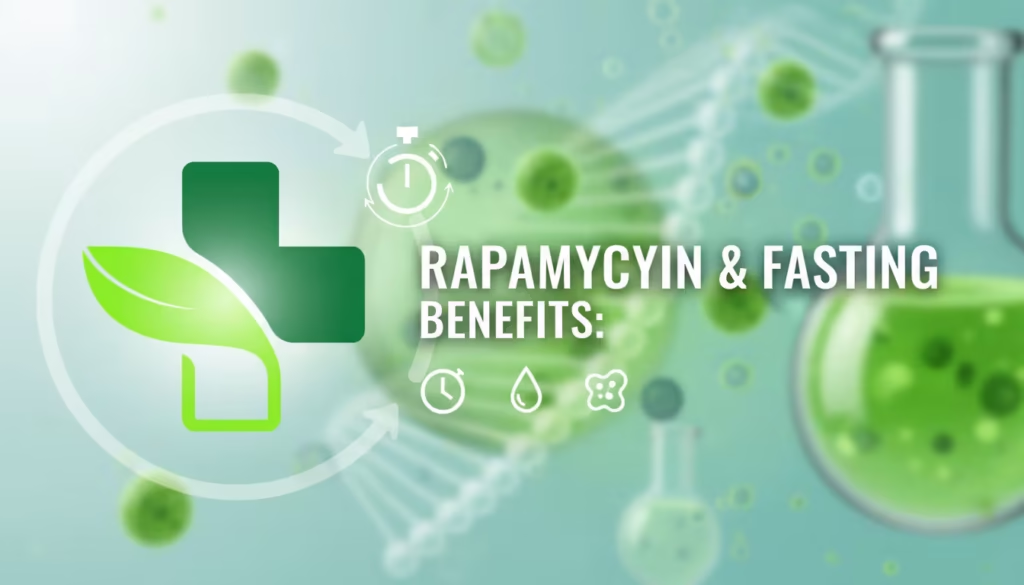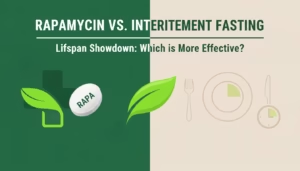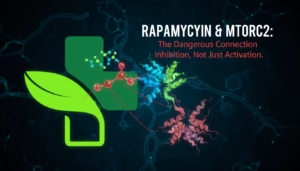Rapamycin Fasting Benefits: How It Mimics Caloric Restriction to Slow Aging

“How eating less (caloric restriction) and using Rapamycin might be related”
“How both affect the same core biological pathway: the mTOR pathway“
Both caloric restriction (CR) and rapamycin influence the mTOR pathway, a central regulator of growth, metabolism, and aging — which is why many researchers now discuss rapamycin fasting benefits and how they compare to traditional dietary restriction. For a deeper explanation of how mTOR controls aging, see Rapamycin and mTOR: Could This Be the Hidden Switch Controlling Aging?.
mTOR stands for “mechanistic Target of Rapamycin” — the very molecule that rapamycin targets, and the one whose activity is reduced during caloric restriction. This connection is also key to understanding rapamycin for human aging and why longevity researchers see overlaps between nutrient sensing, fasting, and pharmaceutical interventions. More insights on this approach are discussed in Is Rapamycin an Effective Longevity Drug?.
| mTOR Active (e.g. lots of food) | mTOR Inhibited (e.g. eating less or rapamycin) |
|---|
| Cells grow and divide rapidly | Cells slow down, focus on repair |
| Increased protein and fat synthesis | Increased autophagy (cellular cleanup) |
| Higher inflammation, oxidative stress | Reduced inflammation, stress resistance |
| Associated with aging and disease | Linked to longevity and healthspan |
So, eating less naturally inhibits mTOR, while rapamycin directly inhibits mTOR — achieving a similar result through different means.
| Factor | Eating Less (Caloric Restriction) | Rapamycin |
|---|
| mTOR inhibition | Indirect (via nutrient sensing) | Direct (drug binds to mTOR complex) |
| Autophagy (cell recycling) | Increased | Increased |
| Inflammation | Decreased | Decreased |
| Oxidative stress | Lowered | Lowered |
| Lifespan extension | Proven in animals, possibly in primates | Proven in animals, being studied in humans |
Caloric Restriction and Longevity
Caloric restriction (CR) — eating ~20–40% fewer calories without malnutrition — has been shown to extend lifespan in a variety of species, from yeast and worms to mice and possibly primates.
CR slows aging by altering cellular metabolism, reducing oxidative stress, and promoting cellular repair and cleanup mechanisms (like autophagy). These effects are often compared to rapamycin for longevity, since both influence similar pathways. A broader context on how rapamycin fits into modern aging science can be seen in What’s Next for Rapamycin? Inside the New Age of Longevity Research.
Rapamycin Mimics Caloric Restriction
By inhibiting mTOR, rapamycin simulates a “low-nutrient” state without actually reducing calories.
This mimics the biological effects of CR, triggering processes like autophagy (cellular cleanup) and reducing age-related damage.
A detailed look at this mechanism is available in Rapamycin Mimics the Effects of Caloric Restriction.
Studies in mice and other animals have shown that rapamycin extends lifespan — often by amounts similar to caloric restriction — which is why many people explore rapamycin anti-aging reviews to understand its real-world impact. Some of the most notable findings are summarized in The Youth Pill: Shocking Scientific Discoveries About Rapamycin.
Rapamycin Effect
In mice, rapamycin can increase lifespan by 10–30%, depending on sex, dosage, and when treatment starts.
In some cases, rapamycin has extended lifespan even when started in older age — a milestone highlighted in Can Rapamycin Really Help You Live Longer?.
Its effectiveness can match or even exceed that of CR in certain models, which is why scientists continue to weigh rapamycin benefits and risks as part of emerging longevity therapies. A forward-looking analysis of this is covered in Rapamycin and the Future of Healthy Aging.
Rapamycin essentially tricks cells into behaving as if you’re on a calorie-restricted diet — activating similar anti-aging pathways — and has been shown in animals to extend life about as effectively as eating less. This showcases its potential as a powerful tool for aging management and deepens the understanding of rapamycin fasting benefits within longevity science. Additional research directions are explored in Rapamycin: Future of Longevity.




